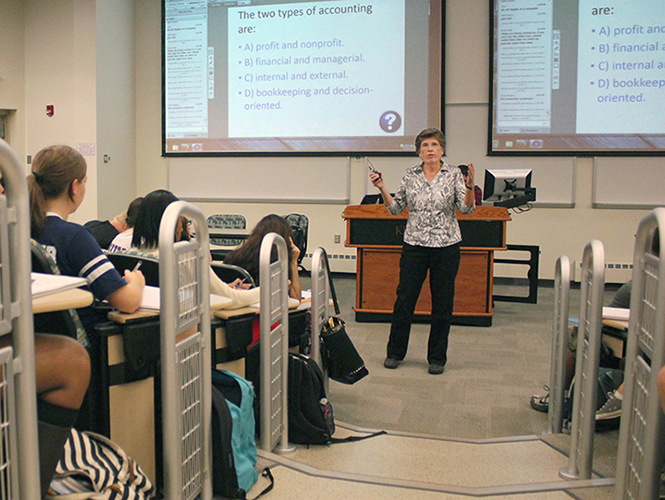Undecided students more likely to be influenced by first class
Associate professor of accounting Wendy Tietz teaches her class about financial accounting on August 28, 2013 in the Business Administration Building. ES. Photo by Erin McLaughlin.
September 5, 2013
Sophomore Brianna Mayle enrolled in Kent State’s integrated social studies major last year. It took only one week of her Education in a Democratic Society class for her to realize education was not for her.
“I wasn’t interested it,” Mayle said. “I realized to be an education major, you have to be interested in the topics we were discussing.”
Much happier as a history major, Mayle said she doesn’t regret the switch.
Her actions are becoming more and more common among students unsure of their career path, according to a new study by researchers from the University of Chicago and Hamilton College in the book How College Works. Students are more likely to choose or move to a major taught by a good introductory professor, researchers found — and leave a major after a bad experience.
The Exploratory Department at Kent State works to match undecided students with a major by the middle of their sophomore year. In this fall’s freshman class, exploratory majors made up the majority.
Steven Antalvari, assistant director of the exploratory advising center, said he has noticed that good professors factor into major choices.
“Professors can be very influential in introductory courses, especially professors who are energetic, that are engaging, that make the students want to learn about it,” Antalvari said. “That’s where passion comes from.”
Antalvari said though the professor is not the only factor, good professors have attracted students to majors they would never have considered otherwise.
Antalvari said the psychology department provides students great introductory classes. Psychology Department Chair Maria Zargonza said when she selects which professors teach those classes, she consciously chooses professors who are good at teaching them.
“We don’t want to turn people away from the field of psychology, even if they don’t choose it as a major,” Zargonza said. “We would hope that an intro class would at least give people a very positive view of the discipline.”
Teaching a General Psychology class, which can have as many as 500 students, takes different skills than a class of 20 or 25 students, Zargonza said.
“When you have someone who has faced with several hundred students, they have to be a master,” Zargonza said. “They have to be interesting. They have to be comprehensible. They have to be really good at delivering information.”
Professor Robin Joynes teaches several hundred students in her General Psychology class. She said she strives not to lose students when competing with Facebook and other things they could be doing on their laptops.
“I specifically request rooms that barely contain the number of students I have so there’s no getting lost in the back of the classroom,” Joynes said. “It’s difficult to ignore someone who’s in your face.”
She said she also keeps her lectures exciting, such as using PowerPoints to interact with the student rather than display the lecture.
“Sometimes, they’re formatted in a way that just poses a question that we’re going to discuss. I’ve also tried using animation or video clips that accurately convey the information in a way that’s step-by-step,” Joynes said. “Sometimes, they contain emotional content. If something is emotional, you’re more likely to remember it later.”
In addition to good professors, some departments also use alternate methods to reach out to students. The Accounting Department uses different formats in their Intro to Financial Accounting course to bring more people in, said department chair Linda Zucca.
Accounting can intimidate some students at first, Zucca said.
“Some of them come in afraid of math, because accounting is a math-based discipline,” Zucca said. “We don’t really use that much math, but I think they’re afraid it’s going to be a difficult course.”
To combat this, the department allows students to participate in the course in a couple of different formats and choose which is right for them. While students can sit in class, watch the lecture and raise their hands to answer questions in the traditional way, they can also watch the lecture at home at the time of the class or at a different time, Zucca said.
They can also ask questions in a module, instead of speaking in front of the class.
“I think I gives [students] a little bit of anonymity so they’re not as afraid to ask questions,” Zucca said. “I think they feel more comfortable with that sometimes than raising their hand in class.”
Contact Lyndsey Schley at [email protected].

























